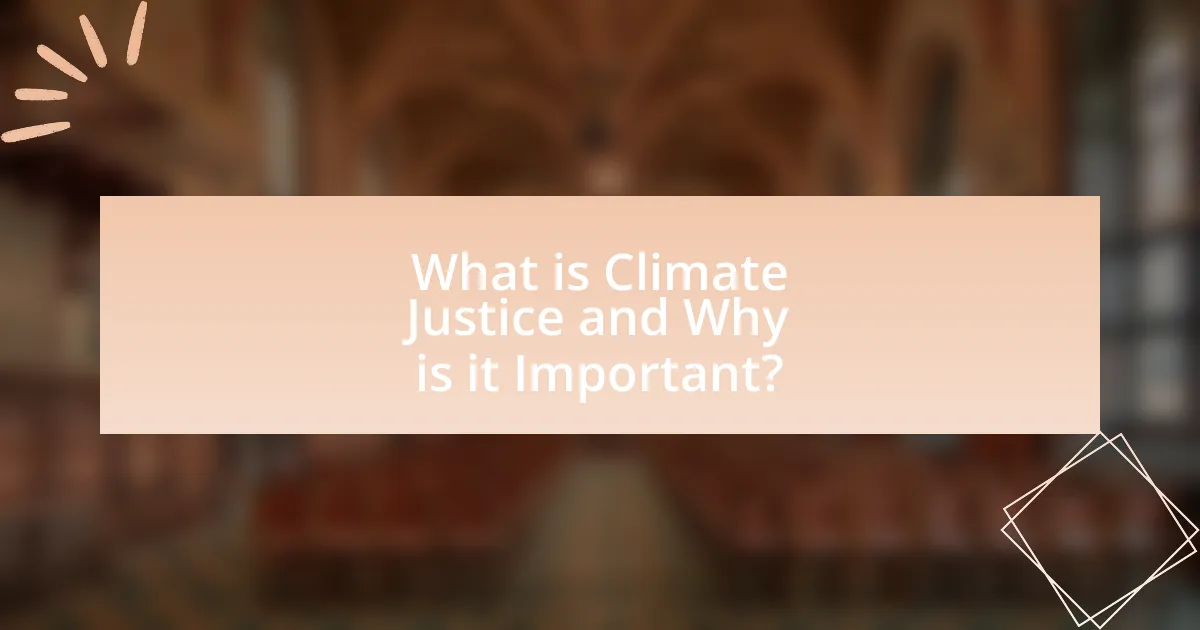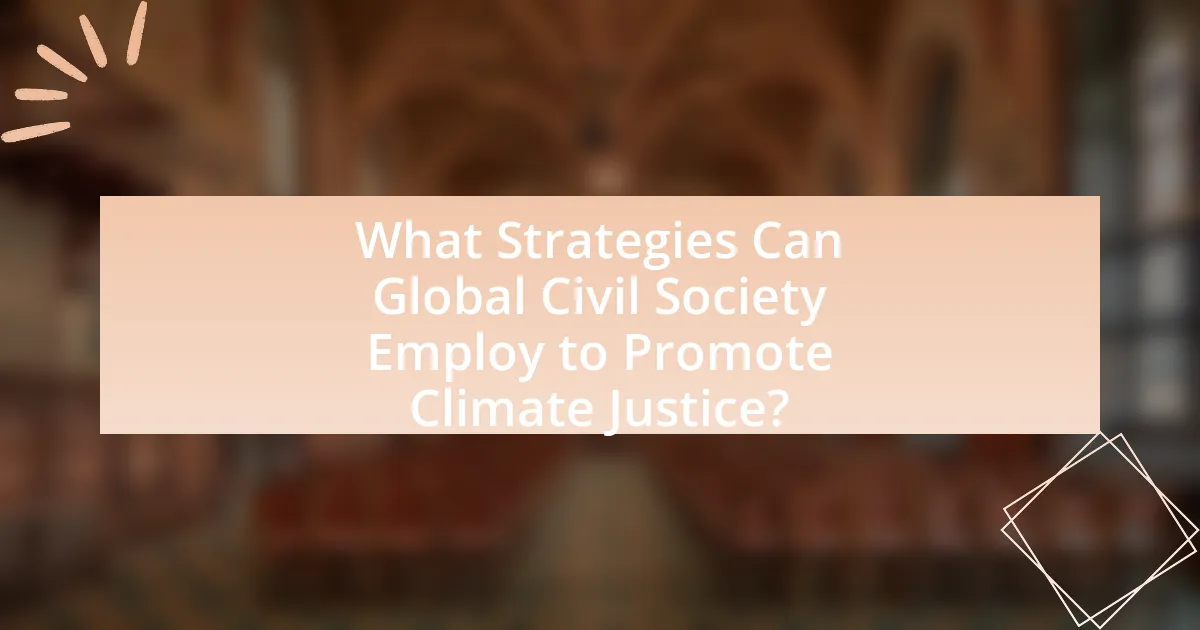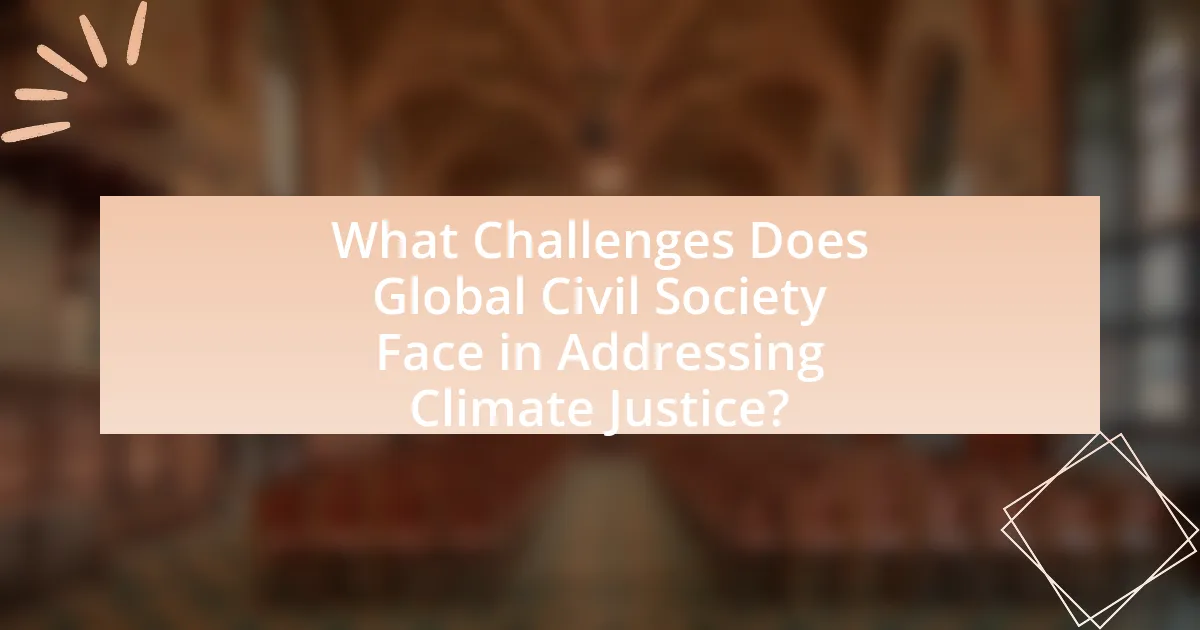Climate justice is defined as the fair treatment of all individuals concerning climate change, particularly focusing on the disproportionate impacts faced by marginalized communities. This article explores the critical role of global civil society in advocating for climate justice, emphasizing the importance of equity, participation, and accountability in addressing environmental inequalities. It examines how organizations and grassroots movements mobilize to support vulnerable populations, influence policy, and promote sustainable practices. Additionally, the article highlights effective advocacy strategies, the significance of education and awareness, and the challenges faced by civil society in achieving climate justice, providing practical steps for individuals to contribute to these efforts.

What is Climate Justice and Why is it Important?
Climate justice refers to the fair treatment of all people in relation to climate change, emphasizing that those who are least responsible for climate change often suffer its worst impacts. It is important because it addresses the inequities in how climate change affects marginalized communities, ensuring that vulnerable populations receive support and resources to adapt and mitigate its effects. According to the Intergovernmental Panel on Climate Change (IPCC), climate change disproportionately impacts low-income and marginalized groups, highlighting the need for equitable solutions that prioritize their needs and rights.
How does Climate Justice relate to Global Civil Society?
Climate Justice is intrinsically linked to Global Civil Society as it mobilizes collective action to address the inequities caused by climate change. Global Civil Society encompasses various non-governmental organizations, grassroots movements, and community groups that advocate for the rights of marginalized populations disproportionately affected by environmental degradation. For instance, organizations like Greenpeace and the World Wildlife Fund work to raise awareness and influence policy changes that promote equitable climate solutions. This relationship is evident in initiatives such as the Paris Agreement, where civil society played a crucial role in pushing for commitments that consider social justice alongside environmental sustainability.
What are the key principles of Climate Justice?
The key principles of Climate Justice include equity, participation, and accountability. Equity emphasizes the fair distribution of environmental benefits and burdens, recognizing that marginalized communities often face the greatest impacts of climate change. Participation ensures that all stakeholders, particularly those affected by climate policies, have a voice in decision-making processes. Accountability holds governments and corporations responsible for their actions regarding climate change, ensuring they adhere to commitments and address injustices. These principles are essential for creating a just and sustainable response to climate change, as highlighted by the United Nations Framework Convention on Climate Change, which stresses the importance of addressing the needs of vulnerable populations.
How does Climate Justice impact marginalized communities?
Climate justice significantly impacts marginalized communities by addressing the disproportionate effects of climate change on these groups. Marginalized communities often face higher vulnerability due to socioeconomic factors, limited access to resources, and systemic inequalities. For instance, a report by the Intergovernmental Panel on Climate Change (IPCC) highlights that low-income populations are more likely to experience severe weather events and health risks associated with climate change. Additionally, climate justice initiatives aim to empower these communities by advocating for equitable policies and resource distribution, ensuring their voices are included in decision-making processes. This approach not only seeks to mitigate the adverse effects of climate change but also promotes social equity and resilience among marginalized populations.
What role does Global Civil Society play in addressing Climate Justice?
Global Civil Society plays a crucial role in addressing Climate Justice by advocating for equitable policies, raising awareness, and mobilizing communities. Organizations within Global Civil Society, such as NGOs and grassroots movements, work to amplify the voices of marginalized communities disproportionately affected by climate change. For instance, the Climate Justice Alliance emphasizes the need for systemic change and equitable resource distribution, highlighting the intersection of social justice and environmental issues. Additionally, Global Civil Society engages in international negotiations, influencing frameworks like the Paris Agreement to ensure that climate actions consider the rights and needs of vulnerable populations. This multifaceted approach demonstrates the significant impact of Global Civil Society in promoting climate justice on a global scale.
How do NGOs contribute to Climate Justice initiatives?
NGOs contribute to Climate Justice initiatives by advocating for marginalized communities disproportionately affected by climate change. They raise awareness about the social and economic impacts of climate policies, ensuring that the voices of vulnerable populations are included in decision-making processes. For instance, organizations like Greenpeace and Oxfam have actively campaigned for equitable climate policies that address the needs of low-income communities and indigenous peoples. Additionally, NGOs often provide resources and support for grassroots movements, facilitating local actions that promote sustainability and resilience against climate impacts. Their efforts are crucial in holding governments and corporations accountable for their environmental responsibilities, thereby fostering a more just and equitable approach to climate action.
What is the significance of grassroots movements in promoting Climate Justice?
Grassroots movements are significant in promoting Climate Justice as they empower local communities to advocate for equitable environmental policies and practices. These movements mobilize individuals to address climate issues that disproportionately affect marginalized populations, ensuring that their voices are heard in decision-making processes. For instance, the global climate strikes initiated by youth activists have raised awareness and pressured governments to take action on climate change, demonstrating the effectiveness of grassroots organizing. Additionally, studies show that grassroots initiatives often lead to more sustainable and inclusive solutions, as they are rooted in the specific needs and experiences of affected communities.

What Strategies Can Global Civil Society Employ to Promote Climate Justice?
Global civil society can employ advocacy, education, and coalition-building strategies to promote climate justice. Advocacy involves mobilizing communities and influencing policymakers to adopt equitable climate policies, as seen in campaigns led by organizations like Greenpeace, which successfully pressured governments to commit to renewable energy targets. Education initiatives raise awareness about the impacts of climate change on marginalized communities, exemplified by the work of the Climate Reality Project, which trains individuals to communicate climate issues effectively. Coalition-building fosters partnerships among diverse stakeholders, enhancing collective action; for instance, the Global Climate Strike, organized by youth activists, united millions worldwide to demand climate action. These strategies collectively empower civil society to address systemic inequalities and promote sustainable solutions.
How can advocacy and policy influence Climate Justice?
Advocacy and policy can significantly influence Climate Justice by shaping regulations and public awareness that address environmental inequalities. Effective advocacy mobilizes communities, raises awareness about the disproportionate impacts of climate change on marginalized groups, and pressures policymakers to enact equitable climate policies. For instance, the Paris Agreement, influenced by advocacy efforts, emphasizes the need for developed nations to support developing countries in their climate initiatives, thereby promoting justice. Furthermore, policies that incorporate social equity considerations, such as the Green New Deal in the United States, aim to create jobs in renewable energy sectors while addressing the needs of vulnerable populations. These examples illustrate how advocacy and policy work together to create frameworks that promote Climate Justice.
What are effective advocacy strategies for Climate Justice?
Effective advocacy strategies for Climate Justice include grassroots mobilization, policy advocacy, and coalition building. Grassroots mobilization empowers communities to engage in local climate actions, raising awareness and fostering collective action. Policy advocacy involves influencing legislation and government policies to prioritize climate justice, often through lobbying efforts and public campaigns. Coalition building brings together diverse stakeholders, including NGOs, community groups, and affected populations, to amplify voices and create a unified front. These strategies have been shown to enhance the effectiveness of climate justice initiatives, as evidenced by successful campaigns like the 2019 Global Climate Strike, which mobilized millions worldwide and influenced policy discussions at various levels.
How can policy changes support Climate Justice efforts?
Policy changes can support Climate Justice efforts by implementing regulations that prioritize the needs of marginalized communities disproportionately affected by climate change. For instance, policies that enforce stricter emissions reductions can lead to improved air quality in low-income neighborhoods, which often suffer from higher pollution levels. Additionally, funding initiatives aimed at renewable energy access for disadvantaged populations can help reduce energy poverty and promote equitable economic opportunities. Research from the United Nations indicates that inclusive climate policies can enhance resilience and adaptive capacity in vulnerable communities, thereby reinforcing the importance of integrating social equity into climate action strategies.
What role does education and awareness play in Climate Justice?
Education and awareness are crucial in advancing Climate Justice by empowering individuals and communities to understand the impacts of climate change and advocate for equitable solutions. Through education, people gain knowledge about environmental issues, the disproportionate effects on marginalized communities, and the importance of sustainable practices. For instance, a study by the United Nations Educational, Scientific and Cultural Organization (UNESCO) highlights that education can enhance climate literacy, enabling individuals to make informed decisions and engage in advocacy efforts. Furthermore, awareness campaigns can mobilize public support for policies that address climate inequalities, as evidenced by grassroots movements that have successfully influenced climate legislation in various countries.
How can educational programs raise awareness about Climate Justice?
Educational programs can raise awareness about Climate Justice by integrating climate education into curricula, promoting critical thinking about environmental issues, and fostering community engagement. These programs can include workshops, seminars, and interactive activities that highlight the disproportionate impacts of climate change on marginalized communities. Research shows that education increases understanding and advocacy; for instance, a study by the National Oceanic and Atmospheric Administration found that educational initiatives significantly enhance public awareness and concern regarding climate-related issues. By equipping individuals with knowledge and tools, educational programs empower them to advocate for equitable climate policies and practices.
What are the best practices for community engagement in Climate Justice education?
The best practices for community engagement in Climate Justice education include fostering inclusive dialogue, utilizing local knowledge, and promoting collaborative action. Inclusive dialogue ensures that diverse voices, particularly marginalized communities, are heard and valued, which is essential for addressing the inequities inherent in climate issues. Utilizing local knowledge allows educators to connect climate justice concepts to the specific environmental and social contexts of the community, enhancing relevance and impact. Collaborative action encourages partnerships among community members, organizations, and institutions, facilitating shared responsibility and collective problem-solving. Research indicates that these practices lead to more effective and sustainable climate justice initiatives, as they empower communities and build resilience against climate impacts.

What Challenges Does Global Civil Society Face in Addressing Climate Justice?
Global civil society faces significant challenges in addressing climate justice, primarily due to limited resources, political resistance, and fragmentation within the movement. Limited financial and human resources hinder the ability of organizations to effectively mobilize and implement climate justice initiatives. Political resistance from governments and corporations often leads to a lack of support for policies that promote equity and sustainability, as seen in the reluctance of some nations to commit to international climate agreements. Additionally, fragmentation within civil society organizations can result in competing agendas and reduced collective impact, making it difficult to present a unified front in advocating for climate justice. These challenges complicate efforts to achieve equitable solutions to climate change, as evidenced by the ongoing disparities in climate impacts and responses across different regions and communities.
What are the main obstacles to effective Climate Justice advocacy?
The main obstacles to effective Climate Justice advocacy include systemic inequality, lack of political will, and insufficient funding. Systemic inequality often results in marginalized communities being disproportionately affected by climate change, which hinders their ability to advocate for their rights. Lack of political will manifests in inadequate policy responses and prioritization of economic interests over environmental justice. Insufficient funding limits the capacity of organizations to mobilize resources, conduct research, and implement advocacy strategies. According to a report by the United Nations Environment Programme, these factors collectively undermine efforts to achieve equitable climate solutions and exacerbate existing social injustices.
How do political and economic factors hinder Climate Justice efforts?
Political and economic factors significantly hinder Climate Justice efforts by prioritizing short-term economic gains over long-term environmental sustainability. Governments often favor policies that support fossil fuel industries due to their economic contributions, which undermines commitments to reduce greenhouse gas emissions. For instance, in 2020, global fossil fuel subsidies reached approximately $400 billion, diverting funds from renewable energy initiatives. Additionally, political instability in many regions can lead to inconsistent climate policies, making it difficult to implement effective climate justice measures. This inconsistency is evident in countries where leadership changes result in shifts away from previously established climate commitments, further complicating global efforts to achieve climate equity.
What role does misinformation play in Climate Justice challenges?
Misinformation significantly undermines Climate Justice efforts by distorting public understanding and policy responses to climate issues. This distortion can lead to a lack of urgency in addressing climate change, as false narratives may downplay its severity or misrepresent the impacts on marginalized communities. For instance, studies have shown that misinformation campaigns can create confusion about the scientific consensus on climate change, which hinders collective action and policy development aimed at achieving equity in climate responses. Furthermore, misinformation can exacerbate existing inequalities by misguiding resource allocation and prioritization in climate adaptation and mitigation strategies, ultimately affecting vulnerable populations disproportionately.
How can Global Civil Society overcome these challenges?
Global Civil Society can overcome challenges related to climate justice by fostering collaboration among diverse stakeholders, including grassroots organizations, policymakers, and the private sector. This collaboration enables the sharing of resources, knowledge, and strategies that enhance advocacy efforts and amplify marginalized voices. For instance, initiatives like the Global Climate Strike demonstrate how collective action can raise awareness and pressure governments to adopt more equitable climate policies. Furthermore, leveraging technology and social media allows Global Civil Society to mobilize support and disseminate information rapidly, as seen in campaigns that have successfully influenced international climate agreements.
What collaborative approaches can enhance Climate Justice initiatives?
Collaborative approaches that can enhance Climate Justice initiatives include multi-stakeholder partnerships, community engagement, and knowledge sharing. Multi-stakeholder partnerships, involving governments, NGOs, and private sectors, facilitate resource pooling and diverse expertise, as seen in the UN’s Climate Action Summit, which brought together various actors to commit to climate goals. Community engagement ensures that marginalized voices are heard, exemplified by initiatives like the Global Climate Strike, where grassroots movements mobilized millions to advocate for climate action. Knowledge sharing through platforms like the Climate Justice Alliance promotes best practices and innovative solutions, fostering a collective understanding of climate issues. These approaches collectively strengthen the effectiveness and inclusivity of Climate Justice initiatives.
How can technology be leveraged to support Climate Justice efforts?
Technology can be leveraged to support Climate Justice efforts by enabling data collection, enhancing communication, and facilitating community engagement. For instance, satellite imagery and remote sensing technologies provide critical data on environmental changes, helping to identify areas most affected by climate change. This data can inform policy decisions and resource allocation, ensuring that marginalized communities receive the support they need. Additionally, social media platforms and mobile applications can amplify the voices of those advocating for climate justice, allowing for greater awareness and mobilization around climate issues. Research from the United Nations Environment Programme highlights that technology can also improve access to renewable energy solutions in underserved areas, promoting equity in energy distribution.
What are some successful examples of Global Civil Society addressing Climate Justice?
Global civil society has successfully addressed climate justice through initiatives like the Fridays for Future movement and the Climate Justice Alliance. Fridays for Future, initiated by Greta Thunberg, mobilized millions worldwide, advocating for urgent climate action and highlighting the disproportionate impact of climate change on marginalized communities. The Climate Justice Alliance, comprising various grassroots organizations, focuses on equitable climate solutions that prioritize the needs of vulnerable populations, emphasizing the importance of community-led strategies. These examples demonstrate the effectiveness of global civil society in raising awareness, influencing policy, and promoting social equity in the context of climate change.
What case studies illustrate effective Climate Justice initiatives?
Case studies illustrating effective Climate Justice initiatives include the “Green New Deal” in the United States and the “Just Transition” framework in various countries. The Green New Deal aims to address climate change while promoting social equity, proposing investments in renewable energy and job creation for marginalized communities. The Just Transition framework focuses on ensuring that workers and communities dependent on fossil fuels are supported in the shift to a sustainable economy, exemplified by initiatives in countries like Canada and Germany that prioritize retraining and economic diversification. These case studies demonstrate the integration of environmental sustainability with social justice, highlighting the importance of inclusive policies in combating climate change.
How have these examples influenced broader Climate Justice movements?
Examples of grassroots activism and community-led initiatives have significantly influenced broader Climate Justice movements by highlighting the intersectionality of environmental issues with social justice. These examples have demonstrated that marginalized communities disproportionately suffer from climate change impacts, leading to a greater emphasis on equity within climate policies. For instance, the Standing Rock protests against the Dakota Access Pipeline galvanized global attention to Indigenous rights and environmental protection, prompting a surge in solidarity actions worldwide. This has resulted in increased advocacy for inclusive decision-making processes and the recognition of Indigenous knowledge in climate strategies, as seen in the incorporation of traditional ecological practices in various climate action frameworks.
What practical steps can individuals take to support Climate Justice through Global Civil Society?
Individuals can support Climate Justice through Global Civil Society by actively participating in advocacy campaigns, joining local and global environmental organizations, and promoting sustainable practices within their communities. Engaging in advocacy allows individuals to influence policy decisions that affect climate justice, as seen in movements like Fridays for Future, which mobilized millions globally to demand action on climate change. Joining organizations such as Greenpeace or the Sierra Club provides individuals with resources and networks to amplify their impact. Additionally, promoting sustainable practices, such as reducing waste and supporting renewable energy initiatives, contributes to a collective effort towards climate justice, evidenced by studies showing that community-led sustainability projects can significantly reduce carbon footprints.